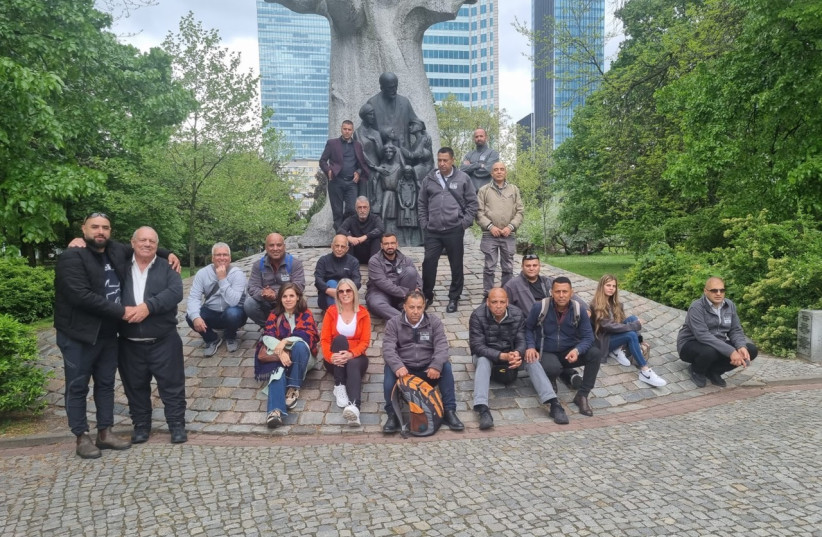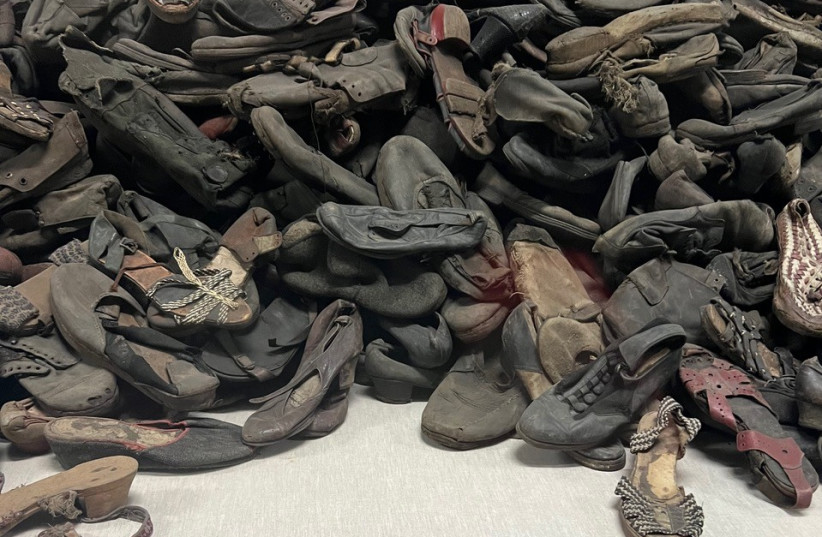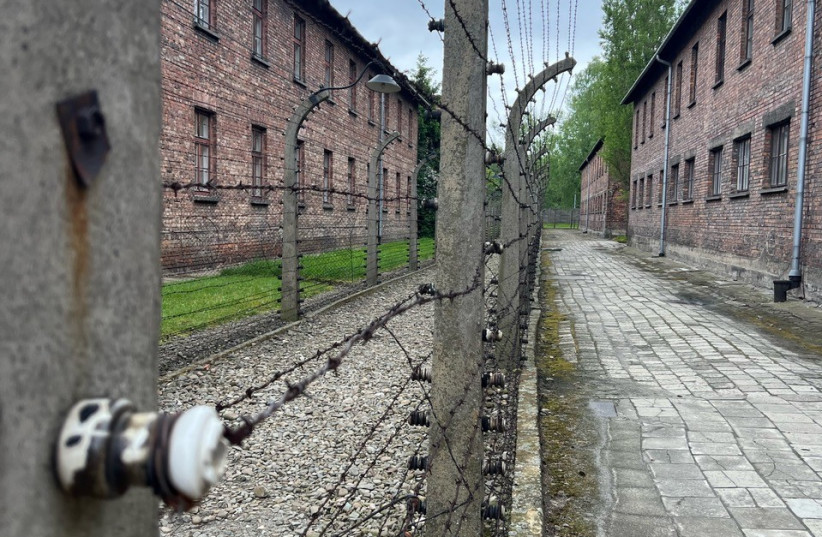As we chat in the passport line at three in the morning, Dalia Fadila tells me about her kids. The oldest graduated from economics and accounting and interned at the Bank of Israel and with Deloitte. Her middle daughter completed law school, articled with the Attorney General and began working at Google. When I say I’m impressed, she explains that she doesn’t give them a choice. "I’ll do the same with my 18 year old”, she says, “If I set him loose in Arab society, it’s like getting him executed. What’s his best chance, a job at MacDonald's? There's no other option; minorities have to excel".
As a Doctor of English Literature from Bar Ilan University, a multi-entrepreneur and the winner of the President's Prize for Education, she mostly reminds me of the state of mind of diaspora Jews, who turned excelling into a way of life.
I joined a delegation of Arab Israelis who seek to learn about Jewish heritage as a way to better integrate, and Dalia introduces me to three smiling young people with kind eyes. Sliman, the head of leadership training with the Atidna movement and Itaf, a communities manager, are busy with 50 twenty-something-year-olds who make up the group, and find a free moment to welcome me and hand me a grey sweatshirt with the delegation's logo. Ismail, Atidna's external advisor, joins me and Dalia, and at first, I'm a bit careful. We’ll be discussing sensitive issues and I'll be spending several days with them in places that are not easy to digest, including Auschwitz and Birkenau.
They express interest in my work as a journalist, and when I tell them about my annual study tracking the coverage of Israel in the New York Times and the inherent biases I found, Ismail says he's not surprised.
"These things happen all the time”, he says, “What about anti-Israeli and even antisemitic media who operate inside Israel, right under the nose of the authorities?" In his opinion, some of them are even being indirectly financed by Hamas.

As the conversation progresses, I discover that we're completely on the same page and that the entire team is bursting with positive energy and optimism. The purpose of Atidna, which Dalia founded in partnership with the entrepreneur Amit Deri – an IDF reserves major who promotes educational initiatives with enormous passion – is to build future leaders who will work towards the true integration of Arab society in Israel.
"Arab-Israelis either have the Palestinian narrative or a vacuum", Dalia explains, "and the vacuum is a recipe for a meaningless life. We’re investing in building the Arab Israeli narrative. Not the tale of victimhood, but rather of belonging, pride, and uniqueness". She is intelligent, pleasant and focused, and makes me feel that there is no one better equipped for this complex, ambitious goal.
Education is the Most Powerful Weapon
Although my grandparents came from Poland, I never took part in this sort of tour. I’m a bit anxious about how I'll feel, especially at the death camps, but in the meantime, I don't hear any Polish by the luggage carousel in Warsaw, only Arabic. The grey sweatshirted group is chatting and giggling excitedly as everyone gathers their bags, and apart from three guides from Yad Vashem who've joined the delegation, I'm the only Jew.
Dalia says it's a shame I don't speak Arabic and can’t distinguish between the various accents.
"The language of someone from Sha'ab isn't the same as a Bedouin from the north or a Bedouin from the south", she laughs. "I'm from Tira, and even I can’t understand the slang of the youngsters from Be'er Sheva". I’m somewhat embarrassed because for me Arabic is just Arabic. It's incredible how nuances and shades are lost to our tendency to generalize people into groups that all seem the same.
As we board the bus, I notice the quiet dominance of Tony Nasser, the CEO of Atidna, a man wholly dedicated to education and a great believer in civilian and national service. He pays careful attention to each and every adult who's joined the delegation, including me.

“We're leading a guideline which requires us to understand what lies at the base of the establishment of Israel, and an event so formative for the Jews with whom we live", he tells me as he hands out copies of Viktor Frankl's book - "Man in Search of Meaning" - to all the regional Arab mayors who have joined the tour, "to understand the meaning of 'Never Again' and how it shaped the Jewish nation". He believes that education is at the root of everything, and that "this material should be part of the educational content throughout Arab society".
On our first day, we tour the remains of the Warsaw Ghetto wall, the Janusz Korczak monument, and the monument for the Warsaw Ghetto fighters who had nothing left to lose when most of the ghetto residents had already been transported to their deaths in packed cattle cars.
"Before the war, there were over three million Jews in Poland", says Motti Turgeman, the guide assigned to the adult's bus, "and after the war, only 200,000 remained. Most of them moved to Israel because their homes had been taken away. Currently, there are only 8,000 Jews living in Poland".
When he tells of the ghetto horrors during its three-year existence, of the overcrowded buildings, the starvation and diseases, the regional mayors move uncomfortably, stunned. Occasionally, one of them asks the sort of questions I stopped asking a long time ago, like "Why did they just surrender?", "Why didn’t Korczak try to smuggle the children out of the orphanage so they could live?", "how come the smart Jews didn’t offer the Nazis some deal that would get them out of there?".
For both them and me it's hard to comprehend the depths of hatred which existed here.
In the Heart Within
Ismail Hajj Yihyeh becomes my favorite contact person in the group – energetic, quick thinking and highly capable.
"You need to understand - when I was 15, I used to protest with Palestinian flags", he tells me during breakfast at the hotel in Krakow, "but then I was exposed to terror attacks, began volunteering in Magen David Adom, and started to ask questions and understand". In his opinion, Arab Israelis need a vision. “Israelis are happy despite all the hardships, because there is great meaning to their very existence in the State, but Arabs don't have that”.

"Everyone who joined this delegation is courageous", he says, "both the regional mayors and the twenty-something-year-olds from the program". He tells me that Ali, one of the participants in last year's "March of the Living", was photographed wrapped in the Israeli flag, and then suffered a wave of threats online.
"The threats are definitely unpleasant, but I believe 60% would rather adopt the Arab-Israeli vision and not the Palestinian one. They just don't want to pay a personal price".
I ask for an example of this price, and he tells me that back when he was dating, in most cases things would blow up once he had expressed his opinion. Nonetheless, his insistence to voice his views paid off – in the end, he found love and was married six months ago.
I join the young people's bus, and on the way to Buczyna forest, a lively discussion sprouts between the guides, Yariv Pinchas and Yehuda Yaron and with Mahmud, a 23-year-old civil engineering student from the Technion. He's a bit tired because, after the evening group conversation with Sliman, which ended at midnight, he completed an assignment that had to be sent in and was up until three in the morning. Minorities, as we said, have to excel.
Mahmud openly shares that his father has ties to the Al Aqsa mosque, his mother is a religious Muslim, and in the neighborhood, there will be those who call him a traitor because of this trip. But as far as he's concerned, it's useless to protest with Palestinian flags. When he's criticized and told that he's disconnected from his roots, he sees it as foolishness. He was also affected by what happened to Ali last year in the March of the Living and encourages me to speak with him.
At Buczyna forest, the group marches silently towards the killing pits, in which masses of Jews were buried after being brought there at night and shot, falling into the giant grave. A total of one and a half million Jews were murdered this way with machine guns, and the contrast between death and the idyllic, flourishing forest, is almost impossible to grasp.
I stare at the Hebrew engraving on the memorial – "As long as in the heart within, the Jewish soul yearns" – and wonder whether the visit here alters the view of the Israeli anthem, which is perceived as exclusionary by some Israeli Arabs. It's not easy for these young people. No one wrote them the narrative that will fill them with a sense of identification, a story that will allow them to live well within both Arab and Jewish society, and in Israel in general. Atidna is now writing that narrative.
This is the place to explain a bit about the Atidna movement, which was established as a partnership between educators from the Arab and the national Zionist Jewish sectors. The movement is based on civil respect and equality within a Jewish, democratic Israel, and its goal is building young leadership, committed to the successful integration of the Arab minority. Atidna runs a youth movement, grants scholarships, provides training for hi-tech, and operates a preparatory and study program for leadership. The joint CEOs, as mentioned, are Dr. Dalia Fadila and Amit Deri.
A 23-Year-Old Juggler
On the way back to Krakow, I sit next to Ali Sufi. The young man, who wrapped himself in the Israeli flag last year and said to the cameras that he was proud to be Israeli, found himself caught in a hellish line of fire. His story sort of became the group's trauma, but it's worth remembering Ali Sufi's name – he's definitely going places.
Ali is a media animal and a multi-tasking juggler – he hangs out with the regional mayors, documents every moment of the tour, and constantly runs the world through his phone. He analyses the political situation with me as if he was Amit Segal while air-dropping me the clip of his viral interview.
"It took 30 minutes for this to reach everyone in the Israeli-Arab society", he recalls the shock he experienced a year ago. "I knew it would go viral, but I didn't expect the speed, the severity or the magnitude. I couldn't sleep for a week, and some of the threats required ISA and police intervention". However, once the wave of invective started to dissolve, he decided to turn the trauma into an opportunity. Given that he sees his future in Dir-el Asad, he made a point of speaking face-to-face with every resident in town who had posted a negative comment about him.
"I didn't change everyone's opinions, but there wasn't a single person who I spoke to that didn't understand why I did what I did", he says. Later, I learn that in addition to his degree in education, he worked with Mansour Abbas on the elections as well as with the head of Dir-el-Assad council, manages community information pages, and in his free time runs Atidna's social media. He loves people and aspires to enter politics and become an elected official.
Our tour of Krakow takes us to the antique synagogue and the charming Jewish Quarter and continues to the square at the edge of the Krakow ghetto, where the expelled Jews were concentrated, patches with the star of David on their arms. After supper, at the end of an exhausting day, Sliman gathers the group and they spend hours working through their experiences. They discuss the significance of history, the nature of leadership and what it means to be human.
"I don’t believe in waiting for someone to give you your rights, rights are meant to be taken, and that’s why I believe in equal obligations – when there are equal obligations, there are equal rights", says Ali Nujeidat, a 22-year-old education student with fire in his eyes, who volunteered in Aharai! and convinced Bedouins from the north to join the IDF. Safa Kaabiya, a law student, thinks every young Arab should enlist in the national service as she did, take responsibility, gain experience and make a difference.
I find myself mesmerized by these energetic youths – intelligent, moral, honest – the salt of the earth. They know that despite the difficulties, they can change reality not only for themselves but for their environment.
A Message to the World
On the third day of the tour, the air is dank and chilly. May in Auschwitz is like January in Israel. We arrive in a town within a natural grove, selected as an appropriate site for death camps because it served as a giant hub of freight railway tracks from all over Europe. Groups of tourists wander around the remains of this camp of horrors, their faces gloomy as the sky. It’s less than ten degrees Celsius and we feel guilty in our warm jackets, wondering how the prisoners who were tortured here managed to survive in minus-20-degree temperatures in winter, with no food and in the thinnest of pajamas.
The sights silence our vibrant Middle Eastern group. One and a half million children were murdered in the Holocaust, and of all the gigantic piles of confiscated suitcases and remains of shaved human hair, it is the tiny toddler boots within the endless mountains of shoes which are the hardest to look at.
As we exit the camp, rigid from the horrors and the cold, I stop for coffee with Wisam Faiz Omar, the council head of Tuba-Zangaria, and Lt. Col. Kais Mazariv, the representative of the Home Front Command. Wisam was most horrified by the photograph of a woman before Auschwitz, and then again, after four months in the camp, a mere skeleton of skin and bones. "When I saw that picture, I decided to bring our high school graduating class here", he says, “last year I had no budget for it, but next year I'll find the budget no matter what".
Kais quietly nods. "The hardest part for me was to realize how we behave", he says. "How is it possible that after all this we don't embrace one another in the State of Israel, and serve as an example of listening, learning and tolerance to the world? If only our politicians served as an example of respect and mutual understanding. It’s heartbreaking that people ended their lives this way, and there is no clear message to the entire world".
Their honest words touch me - hypocrisy and cynicism are erased in Auschwitz- Birkenau. Kais makes me think of how we've all been speaking lately. Some dismiss the internal hatred as something normal that goes back to the days of Altalena, but it isn’t true. We're trying to interpret a completely new era with the rationale of the old world. The ability to distribute information has multiplied, and the platforms reward hatred – it’s a means to increase traffic and income. Too many people generate fake news, simply because they can, and in the end, most of the political messages focus on defaming some social group. As this phenomenon gains significance and power, these become our values as a society.
It's easy to get dragged into, easy to ascribe the traits of extremists to an entire camp, which in reality contains a whole range of views and shades. After seeing the depths humans sunk to when they were fed negative beliefs about Jews, it's difficult to understand why we aren’t more cautious. It’s not only Arabs that need to come here, but also more Jews. 2.5 million tourists visit Auschwitz annually, and less than one hundred thousand of them are Israelis.
Amit and Dalia’s partnership is admirable, even astounding. The monitoring committee of the Arab community tried to fight them, and the Ministry of Education has yet to approve them as a Youth Movement. Nonetheless, slowly and with great determination, the new Arab Israeli movement is growing, yearning to integrate, succeed, connect with the legacy and find their own path within it - the proud, unique narrative of Arab Israelis. It is led by excellent people and backed by Zionist Jewish donors who believe in the future of Atidna, and after a four-day tour with them in Poland, I emerged deeply moved and full of hope.
